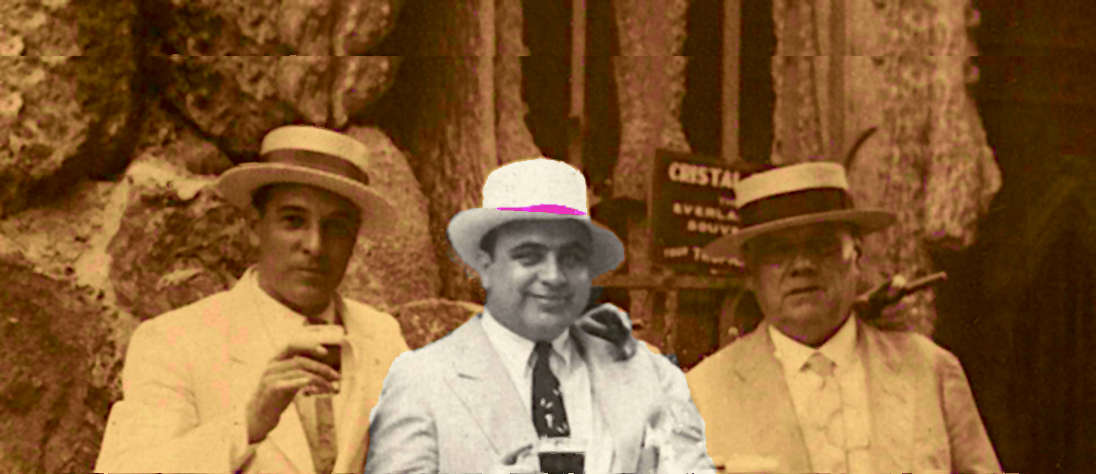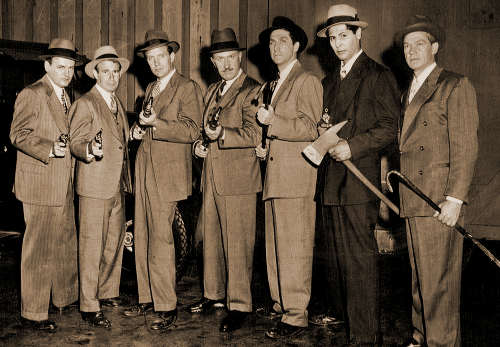
Alcohol, prohibition and Al Capone
The gangster age
Linguapress
A short intermediate level English resource.
A
hundred years ago, you could not buy or consume alcoholic drinks in the
United States. It was the age of "prohibition", and a time when
criminals controlled a whole industry. The most famous gangster was Al
Capone.

The "Untouchables" - from a 1950s TV series. They fought to bring the big criminal gangs to justice. They could not be "bought"
Today you cannot use hard drugs, because it is against the law. The law has decided that drugs are dangerous, and most people believe that the law is right. Today, in many places, you cannot smoke a cigarette in the street. But today, you can sit in a bar and drink a beer — just as long as you are not below the age limit; a hundred years ago, you could not. America was dry. Alcohol was illegal. You could neither drink it nor make it, nor buy it, nor import it, nor sell it.
lf you did, you could go to prison.
Alcohol became illegal in the year 1919; it remained illegal for fourteen years. However, it never disappeared! Before 1919 alcoholic drinks were very popular in the United States. There was a big drinks industry, which employed a great number of people. Suddenly, in 1919, the industry had to stop!
Of course, it could not stop. It stopped officially, but it continued to prosper - unofficially. In place of big business, there was big crime. The Mafia took control of the distribution, and the bosses of the Mafia replaced the bosses of the breweries and the distilleries.

Al Capone, after he was
arrested
Big Bill liked Capone, because he liked his drink. Bill and his drinking friends in the authorities made sure that Capone did not have much trouble. Capone had lots of enemies, but most of his enemies were frightened of him. They knew that Al could kill them, and would kill them, if they were not careful.
Most policemen were very careful not to get in the way of Al Capone, unless they had to. Most policemen, but not all. A small group of policemen, known as "the Untouchables", were determined that Al Capone would not escape from justice for ever. They took several years to do their work, but in the end they succeeded. Al Capone was finally sent to prison.
However, he was never accused of killing, nor of selling alcohol. He was too clever for that. No evidence could incriminate him for that. He was sent to prison for not paying taxes.

as long as - on condition that - remained: continued to be - to prosper: to do well - brewery: a place where beer is made (brewed) - have trouble: have difficuty get in the way of: obstruct - incriminate him: show that he had done something.
Return to Linguapress site index
Printing: Optimized for printing
Copyright © Linguapress. Do not copy this document to any other website
Copying permitted for personal study, or by teachers for use with their students.
This document,
with exercises and answers, is included
in A Background to English,
a collection of 27 B1 - mid-B2 intermediate English reading
texts, with
exercises and answers, available from Amazon
worldwide, and leading
bookstores, including Barnes & Noble in the USA
and Waterstones in the UK.
Achieve success with Linguapress
Student Worksheet
Alcohol,
prohibition and Al Capone
Interactive multiple-choice exercise. Can be completed on screen or on paper :
Here is an extract from the article. Choose the correct answer from the options given in each case. Click the down arrow v to show the options, then select the one that you think is right. 😉 Try to do this exercise without looking back to the article.
To save your answers, take a screenshot when you have finished doing the exercise.
Big Bill liked
Capone,
he liked his drink. Bill and his drinking
friends in the authorities
sure that Capone did not have
trouble.
Capone had
of enemies, but
of his
enemies were frightened of him. They
that Al
kill them, and
kill them, if they were not careful.
Most policemen were careful not to get in the of Al Capone, unless they to. Most policemen, but not . A small group of policemen, known "the Untouchables", were determined Al Capone not escape from justice for . They took years to do their work, but in the they succeeded. Al Capone was finally sent prison.
Most policemen were careful not to get in the of Al Capone, unless they to. Most policemen, but not . A small group of policemen, known "the Untouchables", were determined Al Capone not escape from justice for . They took years to do their work, but in the they succeeded. Al Capone was finally sent prison.
For Teachers
This text exploits a number of grammar points. Pay attention in particular to
Modal verbs
Quantifiers and intensifiers
Expressing negatives
There are several modal verb and quantifier items in the multiple choice exercise.
Negatives
As for negatives, this text illustrates many different ways in which a negative idea can be expressed. As well as just the basic use of not with a verb , as in You cannot or You are not, there are negative forms of adjectives and adverbs, such as illegal ( = not legal) unofficially ( not officially) or untouchable (not touchable) , and several examples of the use of neither ... nor. There is also the word never, as well as an interesting negative infinitive, in not to get in the way of.
For a full guide to the different ways of expressing negatives in English see Descriptive Grammar of English, section 4.5, pages 166 - 169
The Multiple Choice exercise.
This exercise is also available as a separate file : click here. This Multiple choice activity has been carefully prepared to test comprehension, grammar, memory and logic. All the multiple choice options suggested are plausible, so all require thought from the student. In some cases suggested answers may be plausible but ungrammatical, in other cases they may be plausible but illogical; and in others they man be plausible, grammatical and even logical or at least possible.
This teaching resource is © copyright Linguapress
Fully revised and extended 2024 . Originally published in Horizon, the Low-intermediate level English newsmagazine.
Republication on other websites or in print is not authorised
| Linguapress; home | Découvrez l'Angleterre (en français) | Discover Britain |



